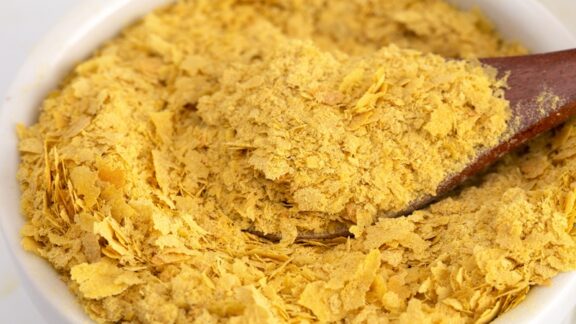The experts at Environmental Nutrition suggest foods to fight constipation, to keep you comfortable and avoid the serious downsides of the common gastrointestinal problem of a blocked bowel.
If you’ve been feeling a little backed up, you’re not alone. Constipation is one of the leading gastrointestinal complaints in America – about 63 million people in the United States experience the condition, according to the National Institute of Diabetes and Digestive and Kidney Diseases (NIDDK). Chances are most of us have experienced constipation, a condition that becomes more prevalent with advancing age.
In lay terms, constipation is the inability to empty your bowels fully or regularly – when fecal matter (stool) moves through the large bowel (colon) too slowly. Having three or fewer bowel movements a week is an indicator of constipation. Left unresolved, Sandra J. Arevalo Valencia, MPH, RDN, Director of Community Health & Wellness at Montefiore Nyack Hospital, says constipation can lead to increased discomfort and pain, as well as the development of hemorrhoids. Yes, that’s definitely not fun.
While there are myriad causes of constipation, which include stress and the use of certain medications, in many cases the origin may be diet related. Sometimes, you can fight constipation by adding certain foods to the diet and by eliminating or reducing the intake of others. These dietary steps may help clear that internal traffic jam.
Foods to fight constipation
Eat and drink more of these
Rye bread
Take a cue from the Scandinavians and stuff your sandwich between slices of hearty rye bread. A study in the Journal of Nutrition found that people experiencing constipation who consumed rye bread daily had improvements in defecation frequency and ease of stool passage compared to white bread. “The added fiber helps to form the feces giving them weight to help them to get out of your system easier,” says Arevalo Valencia. She warns that a diet that is low in dietary fiber, which is common in America, could also be a trigger for constipation. This makes reaching for higher fiber options like rye bread important to help fight constipation. For added fiber, look for options listing whole rye flour/meal as the first ingredient.
Related: Increasing fiber for constipation relief
Dried plums
Yes, it’s true, eating dried plums (aka prunes) can lead to more productive bathroom visits. One study in the journal Clinical Nutrition discovered that healthy adults with reported infrequent stool habits and who typically consumed low amounts of dietary fiber experienced increased stool weight and frequency by consuming 80 grams of prunes – about 8 dried fruit – daily. Prunes likely help to fight constipation because they are high in fiber and sorbitol. The latter is a type of indigestible sugar that pulls water into the bowel to help things flow through easier, giving this delicious dried fruit its natural laxative properties.
Fermented foods such as sauerkraut and yogurt

“It is good to increase the number of good bacteria in your digestive system to have more regular bowel movements,” notes Arevalo Valencia, who adds that fermented foods such as sauerkraut and yogurt are rich in these beneficial probiotic bacteria. Interestingly, an investigation in the European Journal of Clinical Nutrition discovered that consuming fiber-rich rye bread alongside a probiotic-rich yogurt helped relieve gastrointestinal complaints like bloating which are often associated with boosting fiber intake as a method to fight constipation.
Chia seeds
These tiny seeds are a good source of gel-forming soluble fiber. By resisting fermentation and remaining relatively intact during the passage through the large bowel, this soluble fiber increases stool water content resulting in bulky, soft, and easy-to-pass stools. Chia seeds are very versatile and can be added to many foods, considerably boosting the fiber content without too much effort. They work well sprinkled onto cereal, oatmeal, or yogurt.
Kiwi
According to a 2021 paper in the American Journal of Gastroenterology, people with chronic constipation who were provided with 2 kiwi fruit daily experienced increased spontaneous bowel movements, improved stool consistency and less strain required for a bowel movement. Kiwi’s fiber and high-water content may also help get things moving.
Water
When dehydrated, the large intestine cannot provide enough water to properly form stools, which leads to hard stools and more constipation. Note: when adding more fiber-filled foods to your diet to fight constipation, be sure to drink plenty of fluids to help the fiber flow properly through your digestive tract. “The added water combines with fiber to make feces soft and easier to pass,” Arevalo Valencia says. High-water foods, like fresh fruits and veggies, can also improve hydration status.
To fight constipation, eat and drink less of these

Highly processed foods
According to Arevalo Valencia the big problem here is that these foods tend to wedge out high-fiber edibles from the diet and can have an unfavorable impact on the bacteria in your gut. Processed foods tend to be high in fat and low in fiber, a combo that is rough on the colon.
Alcohol
Beer, wine and spirits have diuretic effects and can contribute to constipation. And when someone is drinking alcohol, chances are they are also consuming less water.
High-fat meats
If you are prone to constipation, go easy on the sausage and marbled steaks. Some research suggests that too much saturated fat can contribute to constipation. And typically, people who eat high amounts of fatty meats pair this with low intakes of dietary fiber. But always remember: certain foods (and how much of them you eat) affect people’s bowel functioning differently.
Warning
Constipation may indicate a more serious gastrointestinal disorder, including irritable bowel syndrome (IBS) or other health issues, such as cancer. If your constipation lasts for several days, or if it doesn’t respond to dietary remedies to fight constipation, it might be time to call your doctor.
Reprinted with permission from Environmental Nutrition, a monthly publication of Belvoir Media Group, LLC. 800-829-5384. www.EnvironmentalNutrition.com.
© 2022 Belvoir Media Group. Distributed by Tribune Content Agency, LLC.





